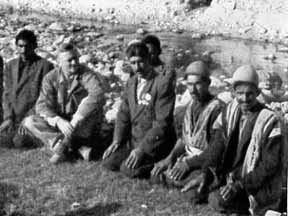
In his post-World War II visit to the Kurdish highlands of Iran, Justice William O. Douglas was clearly thrilled by the resilience of his hosts in the face of threatened Soviet dominance. His comments on the Kurds here are worth remembering more than half a century of political change later:
I learned three things from my visit among the Kurds. ‘First’: Kurdish nationalism is in the marrow of these tribesmen – deeper than any creed or dogma. They want a state of their own, one in which they have a degree of self-government. But their basic loyalty is to Persia. There it will remain. They have pride in the tradition that they are Medes. They have pride in their historic role – border patrol. Neither their misery and poverty nor Communist propaganda have altered those articles of their faith.
‘Second’: The Kurds have a saying, ‘The world is a rose; smell it and pass it on to your friends.’ That philosophy represents today a yearning for a better life, an opportunity to be freed from serfdom that often means death, that always means poverty and misery. There are good things in life; and the Kurds propose to have them. The Kurds have never had great political leadership nor known the art of government. But they have staying qualities that others have lacked. They are the ones that harassed and plagued the ten thousand Greek troops under Xenophon who retreated through Persia to the Black Sea in 401 B. C. Today they are true to character. They will plague any power that stands in the way of social justice.
‘Thir’: At Maky I talked with people about Barzani. Some feared him. Others distrusted him. A lesser khan of the Kurds, though holding no brief for Barzani, felt that there were extenuating circumstances. As a refugee from both Iraq and Persia, Barzani was welcome only in Russia. This khan argued for Barzani’s return to Persia, believing Persia would gain greatly from this move. A Kurdish province could be formed – a province with local autonomy but loyal to the central government at Tehran. Barzani, he maintained, would be a loyal supporter of that regime.
I asked how he could be so sure; why it was not likely that Barzani, if he were brought back, would work for the Soviet interests and turn the Kurdish state into a Soviet puppet.
The Kurd rose and looked at me several minutes before answering. There was pride in his face, and the words came with precision.
‘There is one thing people forget,’ he said. ‘Once a Kurd always a Kurd. On that I will stake my life.’
[Excerpts from William O. Douglas, Strange Lands and Friendly People (New York: Harper & Brothers, 1951), pp. 70-71.]